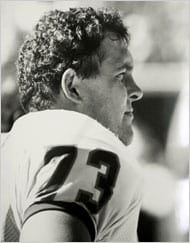San Diego Disability Injury Lawyer

Expert Advocacy
A dedicated law firm offering tailored legal solutions, ensuring justice through expertise, integrity, and commitment.

Traumatic Brain Injury Diagnosed in Sixth Former NFL Player
A 6th former National Football League player has been diagnosed with traumatic brain injuries similar to what boxers suffer from multiple blows to the head.
Doctors at Boston University School of Medicine studied the brain of Tom McHale and determined that he suffered from a traumatic brain injury before his death last May. McHale was 45 and played in the NFL from 1987-1995 for the Tampa Bay Buccaneers.
According to McHale’s family, injuries from football and dealing with his pain led to a psychological downturn:
McHale played on N.F.L. offensive lines for nine seasons, most of them with the Buccaneers, before retiring and running several Tampa-area restaurants. According to his widow, Lisa, he developed such chronic pain in his shoulders and other joints that in 2005 he began taking improperly large doses of the painkiller OxyContin, which exacerbated his lethargy and depression and led him to take cocaine occasionally to offset those effects.
McHale spiraled downward, went through drug rehabilitation three times, and died on May 25, 2008, of a lethal — and deemed by the police, accidental — combination of oxycodone and cocaine. His death shocked many former teammates and players, several of whom remembered him as an intelligent and responsible man.
Doctors concluded that McHale’s condition was the result of repetitive head trauma. In some cases, McHale’s condition can lead to the onset of dementia.
In serious car accidents, people can be subjected to significant forces to their head and brain–not unlike what a boxer or football player experiences. In some cases, this leads to concussions. In others, it leads to traumatic brain injuries. It’s important to keep McHale’s story in mind when we start to see possible signs of traumatic brain injury. In some cases, the injury can progress as severely as McHale’s condition.